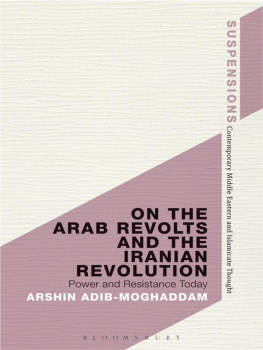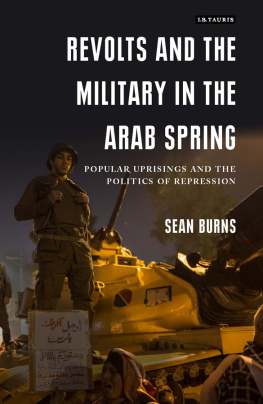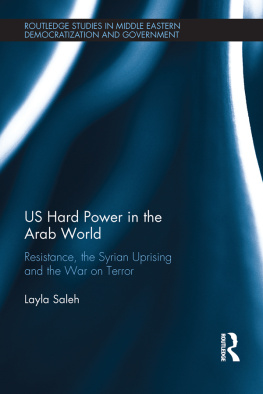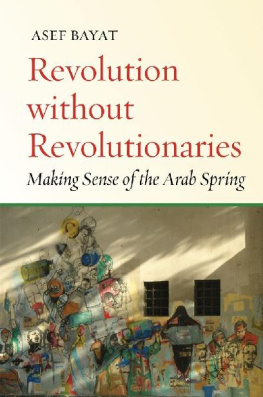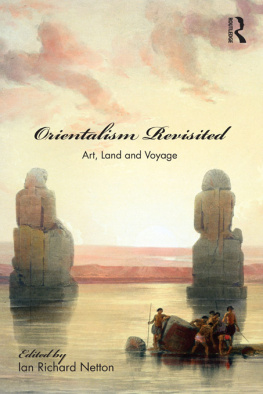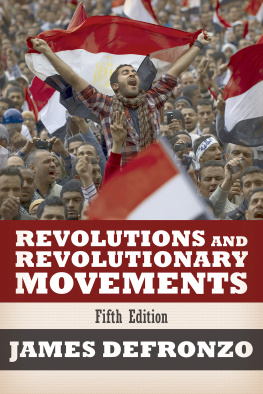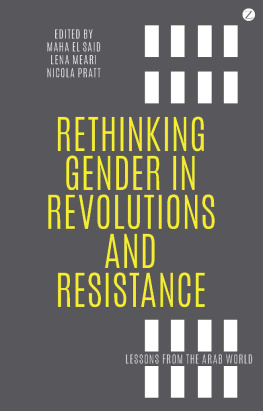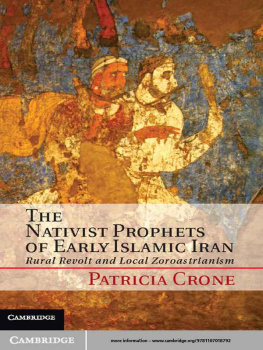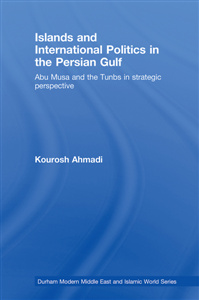Suspensions: Contemporary Middle Eastern and Islamicate Thought
Series editors: Jason Mohaghegh and Lucian Stone
This series interrupts standardized discourses involving the Islamicate world by introducing creative and emerging ideas. The incisive works included in this series provide a counterpoint to the reigning canons of theory, theology, philosophy, literature, and criticism through investigations of vast experiential typologies such as violence, mourning, vulnerability, tension, and humour in light of contemporary Islamicate thought.
On the Arab Revolts and the Iranian Revolution, Arshin Adib-Moghaddam
The Politics of Writing Islam, Mahmut Mutman
The Writing of Violence in the Middle East, Jason Bahbak Mohaghegh
On the Arab Revolts and the Iranian Revolution
Power and Resistance Today
Arshin Adib-Moghaddam
Suspensions: Contemporary Middle Eastern and
Islamicate Thought
Bloomsbury Academic
An imprint of Bloomsbury Publishing Plc
50 Bedford Square London WC1B 3DP UK
1385 Broadway New York NY 10018 USA
www.bloomsbury.com
Bloomsbury is a registered trade mark of Bloomsbury Publishing Plc
First published 2013
Arshin Adib-Moghaddam, 2013
All rights reserved. No part of this publication may be reproduced or transmitted in any form or by any means, electronic or mechanical, including photocopying, recording, or any information storage or retrieval system, without prior permission in writing from the publishers.
Arshin Adib-Moghaddam has asserted his right under the Copyright, Designs and Patents Act, 1988, to be identified as Author of this work.
No responsibility for loss caused to any individual or organization acting on or refraining from action as a result of the material in this publication can be accepted by Bloomsbury Academic or the author.
British Library Cataloguing-in-Publication Data
A catalogue record for this book is available from the British Library.
eISBN: 978-1-47250-614-6
Library of Congress Cataloging-in-Publication Data
A catalog record for this book is available from the Library of Congress.
Contents
Poets, artists, theologians, philosophers and mystics in the Middle East and Islamicate world have been interrogating notions of desire, madness, sensuality, solitude, death, time, space, etc. for centuries, thus constituting an expansive and ever-mutating intellectual landscape. Like all theory and creative outpouring, then, theirs is its own vital constellation a construction cobbled together from singular visceral experiences, intellectual ruins, novel aesthetic techniques, social-political-ideological detours and premonitions of a future built and torn down (partially or in toto), and rebuilt again with slight and severe variations. The horizons shift, and frequently leave those who dare traverse these lands bewildered and vulnerable.
Consequently, these thinkers and their visionary ideas largely remain unknown, or worse, mispronounced and misrepresented in the so-called western world. In the hands of imperialistic frameworks, a select few are deemed worthy of notice and are spoken on behalf of, or rather about. Their ideas are simplified into mere social formulae and empirical scholarly categories. Whereas so-called western philosophers and writers are given full leniency to contemplate the most incisive or abstract ideas, non-western thinkers, especially those located in the imagined realms of the Middle East and Islamicate world, are reduced to speaking of purely political histories or monolithic cultural narratives. In other words, they are distorted and contorted to fit within hegemonic paradigms that steal away their more captivating potential.
Contributors to this series provide a counterpoint to the reigning canons of theory, theology, philosophy, literature, and criticism through investigations of the vast experiential typologies of such regions. Each volume in the series acts as a suspension in the sense that the authors will position contemporary thought in an enigmatic new terrain of inquiry, where it will be compelled to confront unforeseen works of critical and creative imagination. These analyses will not only highlight the full range of current intellectual and artistic trends and their benefits for the citizens of these phantom spheres, but also argue that the ideas themselves are borderless, and thus of great relevance to all citizens of the world.
Jason Bahbak Mohaghegh
and Lucian Stone
First and foremost I would to thank Jason Bahbak Mohaghegh and Lucian Stone for their invitation to contribute to their revolutionary book series. It has given me great strength and hope to know that there are such talented and dedicated comrades out there whose intellectuality represents the possibilities of a bright future and reveal the absurdity of past and present efforts to think and live in terms of one-dimensionalities. This generation is stating a case against monoliths, against seemingly primordial structures, against notions of east versus west, black against white, clashing civilizations. Our current era is creating spaces that are rewardingly hybrid and it is about time that the close dialectics between us and them are more centrally represented in scholarship and public discourse. To that end, Jason and Lucians initiative is indispensable.
The scholarly sections of the present book benefitted from talks/conferences (among others) at Birkbeck College, London, Casa Arabe in Madrid and Cordoba, the Danish Institute of International Studies (DIIS) in Copenhagen, Georgetowns School of Foreign Service in Doha, the British Academy, the German Institute of Global and Area Studies (GIGA) in Hamburg, Medico Internationals annual meeting in Frankfurt, the British Museum, the Contemporary Art Museum in Nottingham, the London School of Economics and Political Science, the Metropolitan University and Institute of International Relations in Prague, and the universities of Aberystwyth, Amman, Brussels, Cambridge, Copenhagen, Durham, Illinois (Urbana-Champaign), Oxford, Southern Denmark and Strasbourg. The last chapter benefitted in particular from exchanges with colleagues and students during the eighth annual conference of the SOAS Palestine Society.
In addition, I have had the chance to interact with several diplomats and decision makers during lectures at the thirteenth Asian Security Conference in New Delhi, which was convened and inaugurated by the defence minister of India A.K. Antony, Chatham House, the German Foreign Office in Berlin as a part of an event organized by the Agha Khan Foundation, the Gulf Research Meeting at the University of Cambridge, the Royal Air Force base at Molesworth, Cambridgeshire, the Royal United Service Institute (RUSI) in London and the NATO Parliamentary Assemblys Mediterranean and Middle East Special Group, which met in Catania and which brought together high ranking officials of the new Tunisia and Egypt and established politicians such as the former secretary of the Arab League Amr Moussa and the former prime minister of Italy, Lamberto Dini. I had another opportunity to make the case against war, in this case against Iran, with a lecture at Whitehall organized by the Global Strategy Forum and Michael Ancram (Lord Lothian) who chaired a panel that included Jonathan Fryer, Jeremy Greenstock and Malcolm Rifkind.


